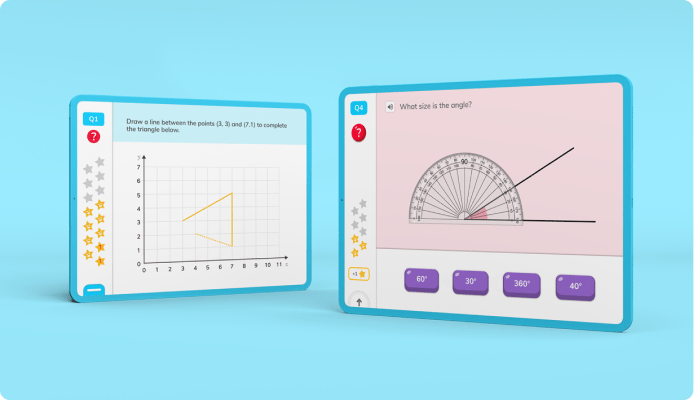You’ve reached the peak of primary school! It’s time to test your maths skills and prepare for Key Stage 3. DoodleMaths offers Year 6 concepts, games, guides, and practice problems to help you stride confidently into the next adventure!

By the end of Year 6, children will:
In Year 6, children learn:
Algebra is introduced in Year 6 maths for the first time. By the end of the year, students should know how to:
In statistics, your child will:
Building even further upon their knowledge of measurement, Year 6 students will:
Year 6 students should be able to do the following by the end of Key Stage 2:

Try DoodleMaths for free!
See how DoodleMaths can support your Year 6 child with maths by creating your account today.

Year 6 maths builds upon the basics to help students develop real-world problem-solving skills. The transition can be tough, but DoodleMaths makes it fun and easy!
Choose a skill to explore below, and they’ll be conquering them all in no time.
Whether it’s your first experience of Year 6 or you’re a seasoned pro with school runs and lunchboxes, we’re here to make primary maths simple, stress-free, and even a little fun!
Dive into our Year 6 maths guides and see how easy learning can be.
Year 6 maths curriculum
Know exactly what your child should master in maths by the start of KS3.
Year 6 maths problems
Shapes, counting & more! Try these 35 Year 6 maths questions at home.
Year 6 maths activities
Discover fun, hands-on Year 6 maths activities to support learning at home or in school.
Click on a year group below to start exploring tailored resources and support.
By the end of Year 6, students should be comfortable with most aspects of maths. They should be able to use the four operations with a range of different whole numbers, decimal numbers, and fractions.
They should also be working independently to problem-solve across the rest of the maths curriculum, using their number knowledge to help them.
With it being the last year of primary school, there are a lot of targets that students should be aiming to meet by the end of the year.
For a full overview of everything your child needs to know, take a look at our full Year 6 curriculum overview!
Year 6 learners will need to complete an SAT assessment at the end of Key Stage 2 in May. This test is a statutory requirement and the results will be used to monitor pupil attainment and compare school performance.
The DoodleLearning maths app has thousands of interactive maths games that are a fantastic way to help your learner with Year 6 maths.
To identify the areas where your child needs some practice, try out these 35 maths questions for Year 6!
Book a chat with our team
If you’d like to use Doodle’s browser version, please visit this page on a desktop.
To log in to Doodle on this device, you can do so through our apps. You can find out how to download them here: